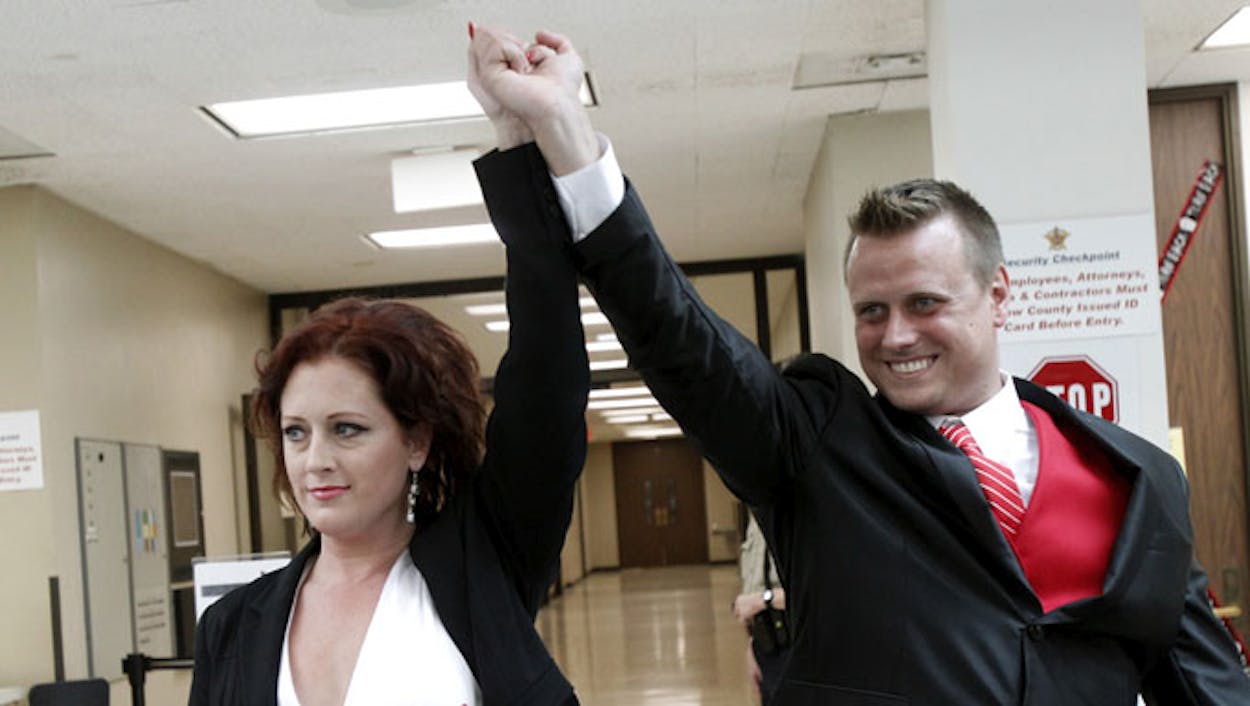 Here’s a stumper: Is it legal for a transgender person—say, someone whose original birth certificate says “male,” but who identifies as a woman—to get married to a man who identifies as a man?
Here’s a stumper: Is it legal for a transgender person—say, someone whose original birth certificate says “male,” but who identifies as a woman—to get married to a man who identifies as a man?
The law in Texas is unclear in ways that have been a nightmare for Nikki Araguz, a transgender Houston woman whose husband, Thomas Araguz, died in 2010 while serving as a volunteer firefighter in Wharton County. Araguz has been fighting in court since her husband’s death for survivor’s benefits, and last week, her case was heard by the 13th Court of Appeals.
Why is the law unclear?
In 2005, Proposition 2 passed in Texas. That constitutional amendment said that “marriage in this state shall consist only of the union of one man and one woman.” Some folks, including 329th District Judge Randy Clapp (using precedent established by the 1999 Texas Court of Appeals decision in Littleton v. Prange), look at Nikki Araguz and see a man; thus, the marriage for which she seeks benefits as her husband’s widow was a same-sex marriage that is not recognized in Texas.
This is complicated, though, by legislation authored by Stte Rep. Lois Kolkhorst (R-Brenham). That legislation, which passed in 2009, allowed that a court order establishing a change in sex was an acceptable document when presenting identification to obtain a marriage license. If proof of gender reassignment surgery is sufficient to grant one a marriage license, then it stands to reason that the marriage of Nikki and Thomas Araguz is legal in Texas.
That sort of confusion is likely part of why Rep. Kolkhorst, along with Senator Tommy Williams, introduced another bill in 2011 that would have eliminated the court order of sex change as an eligible document. (She didn’t respond to questions at the time from DFW’s WFAA about why she wanted to change the list she had amended two years earlier.) That bill failed, and in the most recent regular session, Senators Donna Campbell and Jane Nelson sponsored SB 1218, a bill that would have had the same effect, by maintaining that only photo ID would be sufficient to grant a marriage license, thereby neatly side-stepping the court order of sex change.
SB 1218 was framed as a bill to make the marriage license process more secure (though, for what it’s worth, we’ve never previously heard lawmakers opine about people using non-photo ID to obtain false marriage licenses), but critics of the bill suggested that the intended effect was to resolve, with a resounding “no,” the question of whether or not a transgender person may marry someone who is of the same gender stated on the transgender person’s birth certificate.
SB 1218 passed the Senate (only Senators Wendy Davis and Jose Rodriguez voted against it), but it never made it through the House. Regardless, the fact that legislation has been twice-introduced that would eliminate this document from the list of forms that would allow a marriage license to be granted suggests that the confusion about whether or not a transgender female can marry a man who’s birth certificate states “male” in Texas is far-reaching—and whether or not Nikki Araguz is legally her husband’s widow or not is also up in the air, pending appeal.
The hearing on that appeal happened last week, but the ruling has no timetable yet. And in the meantime, confusion continues to reign. In 2010, Sabrina Hill, a woman who was born intersex (that is, with both male and female genitalia) and declared male on her birth certificate though she identifies as female, applied for a marriage license to marry her girlfriend. A judge’s order, following gender-reassignment surgery, recognized Hill as a woman, but when applying for the license, Therese Bur, the El Paso clerk couldn’t determine whether to use Hill’s birth certificate and issue a license as a heterosexual marriage, or to use the court order and deny it as a same-sex marriage. The clerk turned to Attorney General Greg Abbott for direction, and Abbott declined to weigh in. (Hill and Bur instead went to San Antonio, where they were granted a license.)
It’s probably for the best that they did—if they’d waited for a final decision on Nikki Araguz’s case to settle things (she’s on her second appeal, having lost once in 2012), the now 63-year-old Hill would have no end in sight, regarding how long she’d be waiting.
For her part, while Araguz has vowed to continue her fight in the courts for as long as it takes, she’s also moved on with her life in some ways: immediately after the appeal hearing, she married a man named William Lloyd, after reportedly being granted a license in Nueces County.
AP Photo/Corpus Christi Caller-Times | Michael Zamora








